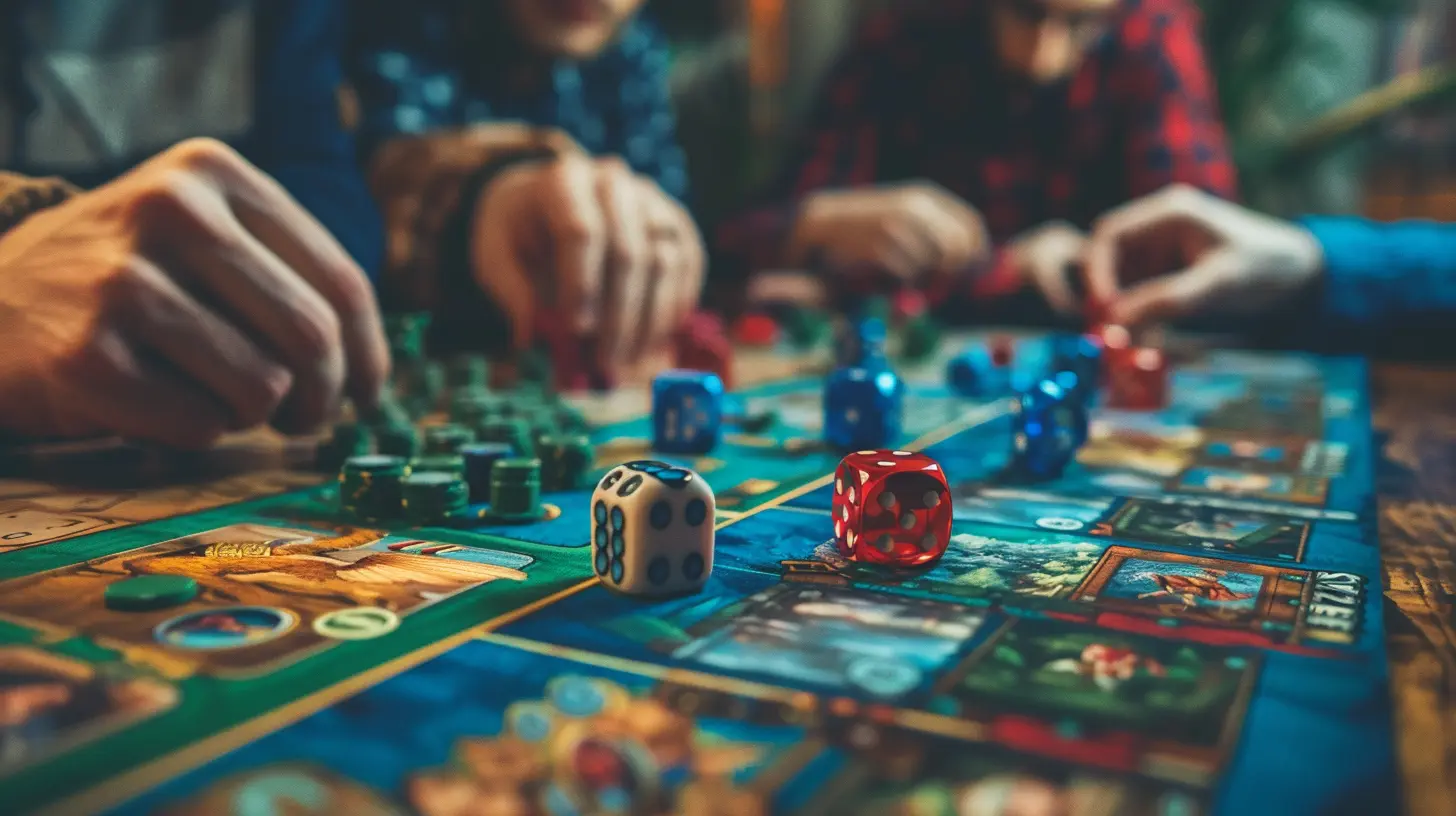Casual Games That Offer More Than Meets the Eye
13 August 2025
When you hear the phrase "casual games," what comes to mind?
Probably something simple, right? Maybe a puzzle game, a match-three adventure, or a cute tap-tap mobile app to kill time while waiting for your coffee. But here’s the kicker: some of these so-called “casual games” pack in storytelling, strategy, and depth that rivals the big-budget titles.
Yup, casual games can be surprisingly deep—like diving into what you thought was a puddle and finding an ocean underneath.
So grab your favorite cozy blanket, get comfy, and let’s dig into some casual games that are way more than what they seem on the surface. 🎮✨
What Are Casual Games, Really?
In case you're new to this world—a “casual game” is typically easy to learn and doesn't demand tons of time, skill, or commitment to enjoy. You won’t need a 300-page wiki guide. No memorizing a button combo that looks like ancient sorcery. Just jump in and play!But hey, don't mistake simplicity for shallowness. There's a growing group of casual games that manage to be fun, friendly, and unexpectedly profound. Let's take a look at a few that really shine.
1. Stardew Valley – Farming With Feelings
From the outside, Stardew Valley looks like a pixelated farm sim. Plant some seeds, feed the chickens, water the crops. But peel back the layers and... boom! You're hit with themes of mental health, relationships, family, and personal growth.Not only do you build a thriving farm, but you rebuild your life.
The town’s NPCs? They’re not mindless robots. They have backstories, secrets, and emotional arcs. You can befriend them, fall in love, or even witness their struggles with anxiety or alcoholism.
And the best part? You deal with everything at your own pace. There’s no “right” way to play Stardew Valley. Just follow your rhythm.
2. Mini Metro – Zen and the Art of Subways
At first glance, Mini Metro is a minimalist puzzle game about drawing subway lines connecting colored stations. Sounds super straightforward, right?But here's the surprise twist: it subtly teaches you the fundamentals of transportation logistics, urban planning, and resource management.
As your map grows, so does the pressure. A gentle start becomes a juggling act of efficiency and design. You’ll find yourself lost in the trance of problem-solving, backed by a calming soundtrack that helps you forget time exists.
It’s like Sudoku... if Sudoku had moving parts and city-wide implications.
3. Hidden Folks – A Whimsical World of Discovery
Imagine Where’s Waldo meets an interactive coloring book. That’s Hidden Folks.This black-and-white hand-drawn game is packed with charming sound effects (all made with the developers' mouths, by the way!) and hundreds of hidden characters to find in busy environments.
But don’t be fooled by the doodle-style art. This game tickles your observation skills, your patience, and your curiosity. It’s a feel-good way to zone out, reflect, and challenge your mind without stress.
Plus, it's oddly meditative. Like ASMR with puzzles!
4. Monument Valley – Geometry Meets Emotion
This one’s an absolute gem.Monument Valley brings together mind-bending optical illusions, impossible geometry, and gorgeous art direction to tell a quiet, touching story.
You guide a silent princess, Ida, through stunning, Escher-like structures. It’s incredibly easy to play—just tap and twist. But with every level, there's a sense of awe and emotional depth that draws you in.
It treats your eyes and your heart with equal care. Trust me, it’s 90% soothing vibes and 10% “Wait, how did I just solve that?!”
5. Alto’s Adventure – Snowboarding Meets Serenity
Let me paint you a picture: mountains, soft snow, a sun that dips just below the horizon, and you—gliding down on a board with nothing but the wind and music in your ears.That’s Alto’s Adventure.
This endless runner doesn't just test your reflexes. It somehow wraps you in a blanket of peace. The changing weather effects, the immersive soundtrack, and the simple one-touch controls come together to create a magical experience.
It’s the kind of game you play to unwind, but you end up staying for the soul-soothing journey.
6. Gris – A Poetic Platformer with Heart
Okay, so Gris is like playing a dream.At first glance, it’s a side-scrolling platformer with watercolor visuals. But beneath that gorgeous surface? It’s a metaphor for grief, recovery, and personal transformation.
There’s no text, no dialogue. Just art, music, and gameplay that evolve as you progress. The colors return to the world as the protagonist heals. Every level represents an emotional stage.
It’s emotionally rich, but in a quiet, beautiful way. A game you don’t just play—you feel it.
7. Donut County – Simple Fun With A Side of Satire
You play as a hole. No joke.In Donut County, your job is to swallow up everything in sight—rocks, cars, people, and eventually whole buildings—as you grow bigger.
But here’s the unexpected twist: behind the silly mechanics is a story about gentrification, consumer culture, and redemption. Yup, this quirky physics-based puzzler is more clever than it first appears.
It’s fun, funny, and deeply snarky. Think: Katamari Damacy meets social commentary.
8. Journey – A Wordless Emotional Rollercoaster
While not traditionally labeled as "casual," Journey’s simplicity in controls and interface makes it accessible to almost anyone.You glide, fly, slide, and explore ancient ruins across a stunning desert landscape. You might meet another player (no names, no chat), and together, you'll experience something unforgettable.
This game is short, subtle, and very emotional. The music, visuals, and connection with an anonymous stranger create something almost magical. You don’t play Journey with your fingers—you play it with your heart.
9. Florence – A 30-Minute Story That Sticks Forever
Florence isn’t long. You can finish it in about half an hour. But it’s maybe the most human experience you can have on your phone.It tells the story of Florence Yeoh—and her journey through first love, career changes, personal growth, and heartbreak. All told through simple interactions like arranging puzzles, drawing pictures, and tapping music notes.
It’s not a game in the traditional sense, but boy does it leave a mark. Simple, elegant, unforgettable.
10. Spiritfarer – A Cozy Game About Letting Go
Last but so not least is Spiritfarer.You play as Stella, a "Spiritfarer"—a guide to the deceased. You build a boat, befriend spirits, cook for them, hear their stories, and eventually help them say goodbye.
Sounds heavy, right? But it’s one of the most heartwarming (and yes, tear-jerking) casual games out there.
Despite dealing with death, it’s full of life. You’ll find comfort in its cozy crafting, emotional storytelling, and slow pace. It’s like if Animal Crossing had a soul-searching cousin.
Why Casual Games Deserve More Love
Let’s be honest—casual games get a bad rap.People often think they’re “just for fun” or lack substance. But the truth is, they’re a bridge. They make profound storytelling, artful design, and emotional experiences accessible to everyone.
You don’t need a fancy console or a dozen hours free. Just a curious heart and a few moments to spare.
And isn’t that beautiful?
Final Thoughts
Casual games are not just sugar-coated time-wasters. They’re sugar on the outside, and soul food on the inside.Whether it’s farming in Stardew Valley, gliding down snowy hills in Alto’s Adventure, or saying goodbye in Spiritfarer—these games stay with you. They make you smile, think, and yes, maybe even cry a little.
So next time you tap on a game that looks “cute” or “easy,” ask yourself—what’s really going on under the hood?
Because in the world of casual games, there’s often a whole lot more than meets the eye.
all images in this post were generated using AI tools
Category:
Casual GamesAuthor:

Lucy Ross
Discussion
rate this article
2 comments
Wren McClendon
I love how casual games can surprise you! They seem simple at first, but they often have deep mechanics and engaging stories that keep you hooked. It's like unwrapping a gift – the more you play, the more delightful surprises you discover! Great article!
February 3, 2026 at 5:55 AM
Nixie McQuillan
Depth in simplicity—don’t underestimate!
August 27, 2025 at 2:50 AM

Lucy Ross
Absolutely! Sometimes the simplest games provide the deepest experiences.


